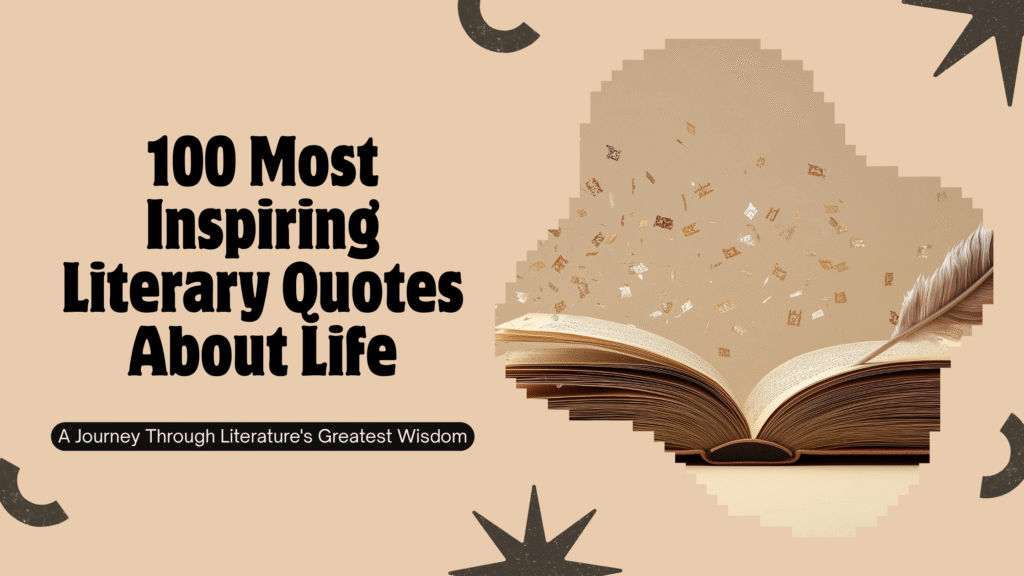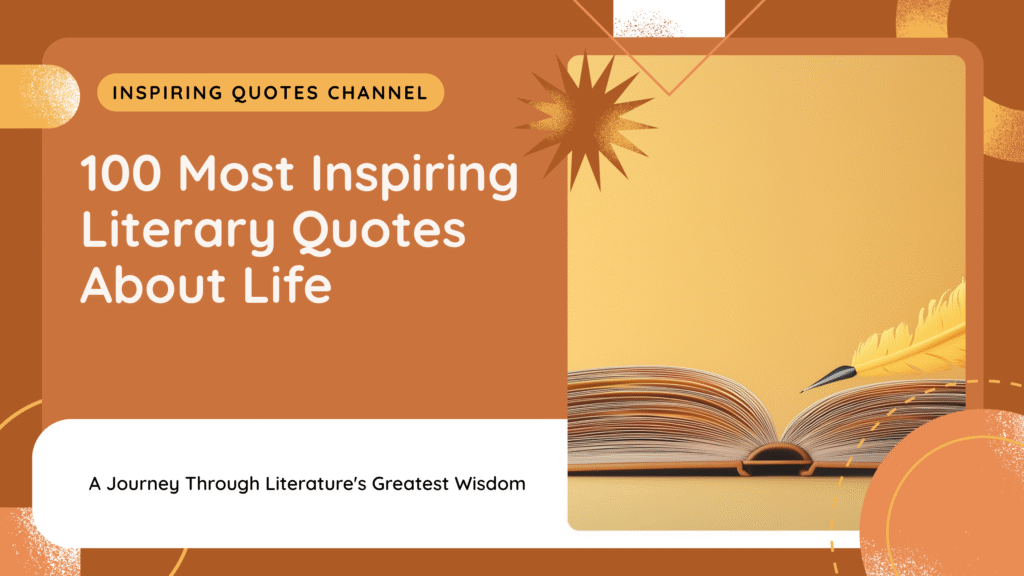100 Most Inspiring Literary Quotes About Life
A Journey Through Literature’s Greatest Wisdom
Literary quotes about life have the extraordinary power to distill complex human experiences into profound, memorable phrases that resonate across generations. From Shakespeare’s contemplations on existence to modern writers’ explorations of identity and purpose, these quotes serve as windows into the human condition, offering wisdom that transcends time and cultural boundaries. This comprehensive exploration examines the most inspiring literary quotes about life, analyzing their historical contexts, literary techniques, and enduring relevance to contemporary readers.
Literature has always been humanity’s most eloquent voice in wrestling with life’s fundamental questions. Through carefully crafted language, authors have captured the essence of what it means to be human—our struggles, triumphs, fears, and hopes. The quotes examined here represent not just beautiful language, but sophisticated philosophical statements that employ various literary devices to convey complex truths about existence. From the metaphysical poetry of the Renaissance to the existential writings of the 20th century, each quote reflects the particular worldview and literary movement of its time while speaking to universal human experiences.
The Classical Foundations: Shakespeare and the Renaissance
William Shakespeare’s Timeless Reflections on Existence
No exploration of literary quotes about life would be complete without examining Shakespeare’s profound contributions to our understanding of human existence. The Bard’s works contain some of literature’s most quoted lines about life, death, and the human condition. His famous soliloquy from Hamlet, “To be, or not to be, that is the question,” represents perhaps the most recognizable philosophical statement in English literature.
This iconic line introduces Hamlet’s contemplation of suicide versus enduring life’s hardships. The quote employs antithesis as a literary device, presenting the fundamental choice between existence and non-existence. Shakespeare’s use of the infinitive “to be” rather than “to live” elevates the discussion from mere survival to philosophical existence, questioning not just whether to continue living, but whether to continue being.
Another profound Shakespearean reflection comes from Macbeth: “Life’s but a walking shadow, a poor player, that struts and frets his hour upon the stage, and then is heard no more: it is a tale told by an idiot, full of sound and fury, signifying nothing”. This extended metaphor comparing life to theatrical performance demonstrates Shakespeare’s mastery of figurative language. The metaphor suggests life’s transient nature while the alliteration in “sound and fury” emphasizes the chaos and meaninglessness Macbeth perceives in existence.
Shakespeare’s “All the world’s a stage, and all the men and women merely players” from As You Like It further develops the theatrical metaphor for life. This quote employs allegory, where human life is compared to a theatrical performance, suggesting that our roles, entrances, and exits are predetermined, yet we must perform them authentically. The word “merely” is particularly significant, implying both limitation and purpose—we are limited to our assigned roles yet essential to the human drama.
The Romantic Movement: Nature, Emotion, and Individual Experience
Wordsworth’s Philosophy of Natural Wisdom
The Romantic movement revolutionized literary approaches to life philosophy, emphasizing individual emotion, nature’s wisdom, and personal experience over classical rationality. William Wordsworth, a central figure in this movement, provided numerous quotes that capture the Romantic sensibility toward life and existence.
Wordsworth’s famous declaration, “The best portion of a good man’s life: his little, nameless unremembered acts of kindness and love,” employs juxtaposition to contrast society’s emphasis on grand achievements with the true value of small, compassionate acts. The alliteration in “little” and “love” creates a gentle, rhythmic quality that reinforces the tender nature of these acts. This quote reflects the Romantic belief in the moral significance of individual emotion and personal relationships.
His line “Nature never did betray the heart that loved her” demonstrates the Romantic faith in nature as a moral teacher and spiritual guide. The personification of nature as a trustworthy friend reflects the movement’s reaction against industrial society and its belief in nature’s inherent goodness. This quote employs metaphor by presenting the relationship with nature as a personal bond of trust and mutual affection.
Byron’s Dark Romanticism
Lord Byron, representing the darker side of Romanticism, offered a more complex view of existence. His quote from Childe Harold’s Pilgrimage, “What exile from himself can flee? / To zones, though more and more remote, / Still, still pursues, where’er I be, / The blight of life — the demon Thought,” uses personification to make thought itself a pursuing demon. The repetition of “still, still” creates emphasis while the metaphor of thought as a “demon” suggests the inescapable nature of self-consciousness and mental anguish.
Byron’s philosophical approach to mortality is captured in “All things that have been born were born to die, / And flesh (which Death mows down to hay) is grass”. This quote employs biblical allusion and metaphor, comparing human flesh to grass and death to a harvester. The cyclical imagery reinforces themes of mortality and the natural order, while the alliteration in “Death” and “down” creates a somber, rhythmic effect.
American Transcendentalism: Self-Reliance and Spiritual Democracy
Emerson’s Philosophy of Individual Power
Ralph Waldo Emerson, the philosophical leader of American Transcendentalism, contributed numerous quotes that celebrate individual potential and spiritual self-reliance. His famous assertion, “To be yourself in a world that is constantly trying to make you something else is the greatest accomplishment,” employs antithesis to contrast authentic selfhood with social conformity.
This quote demonstrates Emerson’s central belief in individualism and resistance to social pressure. The phrase “constantly trying” suggests relentless external pressure, while “greatest accomplishment” elevates personal authenticity above conventional achievements. The quote’s enduring popularity reflects its relevance to contemporary concerns about social media, peer pressure, and authentic identity.
Emerson’s “A foolish consistency is the hobgoblin of little minds, adored by little statesmen and philosophers and divines” uses metaphor and alliteration to critique rigid thinking. The metaphor of consistency as a “hobgoblin” suggests that inflexible thinking is both frightening and foolish, while the repeated “little” emphasizes the intellectual limitations of those who cannot adapt their thinking.
Thoreau’s Deliberate Living
Henry David Thoreau, Emerson’s protégé and fellow Transcendentalist, provided one of literature’s most famous declarations about intentional living: “I went to the woods because I wished to live deliberately, to front only the essential facts of life, and see if I could not learn what it had to teach, and not, when I came to die, discover that I had not lived”.
This extended statement employs parallel structure and metaphor to explain Thoreau’s experiment at Walden Pond. The phrase “live deliberately” becomes a central concept in American literature, suggesting conscious choice and intentional action rather than passive existence. The contrast between learning from life and discovering one had not lived creates dramatic tension and philosophical urgency.
Thoreau’s more concise wisdom appears in quotes like “The mass of men lead lives of quiet desperation”. This paradox uses “quiet desperation” to describe the hidden suffering of apparently normal lives. The alliteration in “mass of men” and the oxymoronic quality of “quiet desperation” create memorable phrasing while conveying Thoreau’s critique of conventional society.
Victorian Literature: Moral Purpose and Social Consciousness
The Victorian Approach to Life Philosophy
Victorian literature, reflecting the era’s moral earnestness and social consciousness, produced numerous quotes about life that emphasized duty, progress, and moral development. The period’s literature was characterized by realism and moral purpose, often depicting daily life while advocating for social improvement.
Writers like George Eliot contributed philosophical reflections such as “It is never too late to be what you might have been”. This quote employs potential mood and metaphor to suggest that human development is ongoing and that transformation remains possible throughout life. The sentiment reflects Victorian beliefs in self-improvement and moral progress.
The Victorian emphasis on moral character appears in quotes that examine the relationship between individual choices and character development. These quotes often employ didactic tone and moral allegory to convey lessons about proper living and social responsibility.
Modernist Literature: Alienation and Existential Questions
The Existential Turn in Literary Quotes
The 20th century brought profound changes to literary approaches to life philosophy, with modernist writers exploring themes of alienation, meaninglessness, and existential anxiety. Writers like Franz Kafka and Albert Camus created quotes that capture the modern condition of uncertainty and philosophical questioning.
Kafka’s observation, “I cannot make you understand. I cannot make anyone understand what is happening inside me. I cannot even explain it to myself,” from The Metamorphosis employs repetition and parallelism to emphasize the isolation and confusion of modern existence. The repeated “I cannot” creates a rhythm of impossibility while highlighting the difficulty of human communication and self-understanding.
Albert Camus contributed numerous quotes exploring the absurd condition of human existence. His statement, “You will never be happy if you continue to search for what happiness consists of. You will never live if you are looking for the meaning of life,” uses paradox and parallel structure to suggest that the search for meaning may prevent authentic living. This reflects existentialist themes about creating meaning through action rather than discovering predetermined purpose.
Virginia Woolf and Stream of Consciousness
Virginia Woolf, a key modernist writer, contributed quotes that explore consciousness, identity, and women’s experience. Her famous assertion, “A woman must have money and a room of her own if she is to write fiction,” from A Room of One’s Own employs metonymy (room representing independence) and conditional structure to argue for women’s economic and intellectual independence.
Woolf’s philosophical approach to existence appears in quotes like “No need to hurry. No need to sparkle. No need to be anybody but oneself”. The anaphora (repetition of “No need”) creates rhythmic emphasis while the final phrase advocates for authentic selfhood. This quote reflects modernist concerns with individual identity and resistance to social expectations.

Contemporary Literature: Diversity and Global Perspectives
Postcolonial and Multicultural Voices
Contemporary literature has expanded the range of perspectives on life philosophy, incorporating voices from previously marginalized communities and exploring themes of identity, cultural displacement, and globalization. Writers like Toni Morrison, Margaret Atwood, and postcolonial authors have contributed quotes that reflect diverse experiences and philosophical approaches.
Toni Morrison’s wisdom appears in quotes like “If you surrendered to the air, you could ride it,” from Song of Solomon. This metaphor suggests that accepting life’s uncertainties might lead to freedom and possibility. Morrison’s approach to life philosophy often incorporates African American cultural perspectives and experiences of historical trauma and resilience.
Margaret Atwood’s observation, “If you’re not annoying somebody, you’re not alive,” employs humor and hyperbole to suggest that authentic living necessarily involves some conflict with social expectations. This reflects contemporary literature’s often ironic and complex approach to life philosophy.
Literary Techniques in Life Philosophy Quotes
Rhetorical Devices and Their Effects
The most effective literary quotes about life employ sophisticated rhetorical devices to create memorable and meaningful statements. Metaphor and simile allow writers to compare abstract concepts (life, death, love) to concrete images, making complex ideas accessible and memorable.
Antithesis and paradox create intellectual tension that forces readers to consider opposing ideas simultaneously. This technique appears frequently in philosophical quotes because it mirrors the complexity of human experience, where seemingly contradictory truths often coexist.
Alliteration and assonance create rhythmic effects that make quotes more memorable and aesthetically pleasing. These sound devices also contribute to the emotional impact of quotes by creating pleasing or jarring auditory effects.
Personification allows writers to give human characteristics to abstract concepts, making philosophical ideas more relatable and emotionally engaging. This technique appears frequently in quotes about nature, death, and other abstract forces.

Thematic Analysis: Universal Themes in Literary Life Quotes
Love, Death, and Meaning
Literary quotes about life consistently explore several universal themes that transcend cultural and historical boundaries. Love appears as both a source of meaning and a cause of suffering, with writers from different periods offering varying perspectives on its role in human existence.
Death and mortality serve as central concerns in life philosophy quotes, with different literary movements approaching these themes in characteristic ways. Renaissance writers often viewed death through religious frameworks, while modern writers tend to explore death’s relationship to meaning and authenticity.
The search for meaning represents perhaps the most consistent theme across literary periods, with writers offering various approaches to finding or creating purpose in existence. These approaches range from religious faith to personal relationships to creative expression.
Individual versus society tensions appear throughout literary quotes about life, reflecting ongoing concerns about authenticity, conformity, and social responsibility. This theme connects to broader questions about how individuals should relate to their communities and cultures.
FAQ Section
1. What makes a literary quote about life particularly powerful or memorable?
Powerful literary quotes about life typically combine philosophical depth with memorable language. They employ literary devices like metaphor, antithesis, and alliteration to create quotable phrases that stick in readers’ minds. Additionally, the most effective quotes address universal human experiences while using specific, concrete imagery to make abstract concepts tangible.
2. How do literary quotes about life differ across historical periods?
Literary quotes about life reflect the dominant philosophical and cultural concerns of their historical periods. Renaissance quotes often emphasize religious themes and moral order, Romantic quotes celebrate individual emotion and nature’s wisdom, Victorian quotes focus on moral development and social progress, modernist quotes explore alienation and existential uncertainty, while contemporary quotes incorporate diverse global perspectives and postmodern skepticism.
3. Why do Shakespeare’s quotes about life remain so popular today?
Shakespeare’s quotes endure because they address timeless human concerns through masterful use of language34. His quotes employ sophisticated literary devices like metaphor and paradox to explore universal themes such as love, death, ambition, and identity. Additionally, Shakespeare’s psychological insight into human nature allows his characters’ reflections on life to remain relevant across centuries.
4. How can students effectively analyze literary quotes about life?
Students should examine several elements when analyzing literary quotes: the historical and biographical context of the author, the literary devices employed, the thematic content, and the quote’s relationship to larger philosophical or cultural movements. Effective analysis involves identifying specific techniques like metaphor or alliteration, explaining how these techniques contribute to meaning, and connecting the quote to broader themes in literature and life.
5. What role do literary devices play in making life philosophy quotes memorable?
Literary devices serve multiple functions in philosophical quotes. They create memorable language through sound effects (alliteration, rhythm), make abstract concepts concrete through figurative language (metaphor, personification), and create intellectual engagement through techniques like paradox and antithesis. These devices help quotes transcend their original contexts to become part of cultural discourse.
6. How do modern literary quotes about life differ from classical ones?
Modern literary quotes often reflect increased psychological sophistication, cultural diversity, and philosophical skepticism compared to classical quotes. While classical quotes frequently assume shared moral frameworks or religious beliefs, modern quotes tend to explore subjective experience, cultural relativism, and existential uncertainty. Contemporary quotes also incorporate global perspectives and marginalized voices previously absent from literary discourse.
7. What themes appear most frequently in literary quotes about life?
The most common themes include mortality and the meaning of death, the nature of love and relationships, the search for purpose and meaning, the tension between individual identity and social expectations, the role of suffering in human experience, and the relationship between humans and nature. These themes appear across different literary periods, though their treatment varies according to cultural and philosophical contexts.
8. How can educators effectively use literary quotes about life in the classroom?
Educators can use literary quotes as entry points for discussing larger themes, historical contexts, and literary techniques. Effective classroom use involves providing historical context, analyzing literary devices, connecting quotes to students’ experiences, and encouraging critical thinking about the ideas presented. Quotes can serve as writing prompts, discussion starters, or examples of effective use of language.
9. Why do certain literary quotes about life become part of popular culture?
Quotes enter popular culture when they successfully express complex ideas in memorable, accessible language. This typically occurs when quotes employ effective literary devices, address universal human experiences, and provide language for concepts people want to express but lack words for. The most culturally influential quotes often serve as shorthand for complex philosophical or emotional states.
Literary quotes about life represent humanity’s ongoing attempt to understand existence through the power of language. From Shakespeare’s eternal questions to contemporary writers’ diverse perspectives, these quotes demonstrate literature’s unique ability to distill complex human experiences into memorable, meaningful phrases. By examining these quotes through the lens of literary analysis, we gain insight not only into the writers’ perspectives but also into the continuing human quest for meaning, understanding, and wisdom. As readers and scholars, we participate in this ongoing conversation about what it means to be human, finding in literature’s greatest quotes both comfort and challenge, both answers and new questions to ponder.


1 thought on “100 Most Inspiring Literary Quotes About Life”